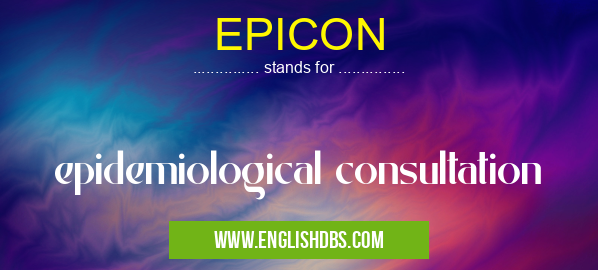What does EPICON mean in MEDICAL
EPICON stands for epidemiological consultation, which is an important and often necessary element to the practice of public health. It is a collaboration between epidemiologists and other healthcare professionals that allows for in-depth evaluation and review of health risks, considerations, and outcomes. EPICON can help to assess the spread of disease and inform public safety decisions.

EPICON meaning in Medical in Medical
EPICON mostly used in an acronym Medical in Category Medical that means epidemiological consultation
Shorthand: EPICON,
Full Form: epidemiological consultation
For more information of "epidemiological consultation", see the section below.
Essential Questions and Answers on epidemiological consultation in "MEDICAL»MEDICAL"
What is EPICON?
EPICON stands for epidemiological consultation, which is a collaboration between epidemiologists and other healthcare professionals that allows for in-depth evaluation and review of health risks, considerations, and outcomes.
How can EPICON help?
EPICON can help to assess the spread of disease and inform public safety decisions. In particular, it can provide valuable insight into finding the source or causes of diseases or illnesses so that those affected can be treated accordingly.
Who typically performs these consultations?
Epidemiological consultations are usually performed by experienced medical professionals such as epidemiologists or medical doctors who specialize in infectious diseases or biostatistics. They may also involve specialists from other domains such as public health workers in order to ensure all perspectives are taken into consideration when making decisions about prevention and treatment.
What types of data does EPICON collect?
During an epidemiological consultation, data will typically be collected from interviews with individuals who have been affected by a certain illness or condition as well as from laboratory tests or surveys administered to larger populations. This data will then be analyzed so that it can inform any future public health decisions regarding prevention, treatment, or policies associated with a particular disease or illness.
How long do these consultations take?
Depending on the complexity of the situation being evaluated, an epidemiological consultation could take anywhere from several hours to weeks or months to complete. Ultimately it depends on how much data needs to be collected and analyzed before a determination can be made regarding prevention activities or treatments needed for affected individuals.
Final Words:
Epidemiological consultation (EPICON) is an important part of public health practices as it provides insight into potential causes of illness which can then help inform policy on prevention and treatment efforts moving forward. It involves experienced medical professionals who collaborate together in order to collect relevant data points so that informed decisions can be made accordingly. Thus, EPICON plays a vital role across many facets of modern day medicine as its use helps enable personnel issuing recommendations related to population health management initiatives that have been implemented on national levels across countries around the world.
